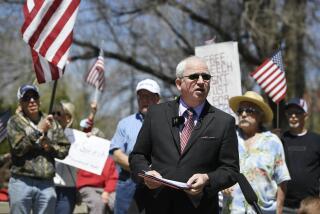No Immunity for Lewinsky, Judge Reportedly Rules
- Share via
WASHINGTON — In a significant victory for independent counsel Kenneth W. Starr, a federal judge has ruled that former White House intern Monica S. Lewinsky does not have immunity from prosecution in the investigation of whether President Clinton lied about or tried to cover up the nature of his relationship with her, sources said Wednesday.
A sealed ruling by U.S. District Judge Norma Holloway Johnson is likely to mark a turning point in the 3-month-old investigation, leading to grand jury testimony from Lewinsky and other witnesses on matters central to the case.
Starr’s prosecutors want Lewinsky to testify under oath about the precise nature of her relationship with the president, whether Clinton asked her or others to lie about it under oath and how Clinton advisor Vernon E. Jordan Jr. happened to line up a job offer for her--as well as other matters.
Sources close to either side of the investigation who asked not to be identified said it is possible that Johnson had stopped short of a formal ruling but had communicated her intention to both sides before Wednesday.
In declining to confirm that the judge had issued a ruling, Charles G. Bakaly III, counselor to Starr, said: “We cannot comment about sealed proceedings before the court.”
Lewinsky’s testimony also would open the door to a grand jury appearance by her former friend, Linda Tripp, who taped her phone conversations with the former intern and told Starr’s office that Lewinsky had told her of a sexual relationship with Clinton. In January, Tripp wore a surveillance wire to a meeting at which Lewinsky was later approached by Starr’s prosecutors.
Lewinsky’s testimony is not yet guaranteed, however.
Her attorney, William Ginsburg, told reporters in Los Angeles: “We have received neither a valid order nor an opinion, and we have not been notified that any such documents are pending.”
Ginsburg had previously told The Times that if Judge Johnson ruled in Starr’s favor he would promptly appeal. One source familiar with the investigation would not rule out that Johnson’s order already has been appealed.
Lewinsky and her stepmother drove up to her father’s home in Brentwood on Wednesday and made no comment before walking inside, the Associated Press reported.
Because it delayed and possibly could have prevented Lewinsky’s appearance before the grand jury, the immunity dispute had been a major obstacle to Starr’s investigation. Based on an offer that Starr’s prosecutors supposedly made to Lewinsky in January, her lawyers have insisted that they had what should be considered a binding agreement granting her immunity.
At least two of Starr’s prosecutors had recommended that Lewinsky be granted immunity in exchange for her pledge to testify that she engaged in oral sex with Clinton.
But Lewinsky had made no commitment to provide testimony that would implicate the president or any of his advisors, including Jordan, in a cover-up or other obstruction of justice, and Starr contended that no deal had been reached.
Both sides submitted court briefs and on March 5 argued the matter before Judge Johnson.
If Ginsburg’s likely appeal of Johnson’s ruling is rejected by the U.S. Circuit Court of Appeals for the District of Columbia, Lewinsky would have to testify or face possible prosecution or contempt proceedings--barring a further appeal to the U.S. Supreme Court.
Starr could bring Lewinsky before the grand jury and, if she refuses to testify on grounds of self-incrimination, he could seek to compel her testimony by granting her immunity from prosecution for anything she says. Starr also could seek to indict Lewinsky for testifying falsely in January when she signed an affidavit swearing that she “never had a sexual relationship” with Clinton.
In addition to perjury, Lewinsky conceivably could be prosecuted for encouraging Tripp to testify falsely about Clinton’s encounter with former White House volunteer Kathleen E. Willey. Tripp has told investigators that, as Paula Corbin Jones’ lawyers sought to question her, Lewinsky presented her with suggested “talking points.”
Starr’s critics have ridiculed the idea of taking criminal action against the now 25-year-old former White House intern.
Willey has said that Clinton made an unwanted sexual advance toward her in a Nov. 29, 1993, encounter near the Oval Office. In his Jan. 17 deposition in the Jones sexual harassment case, Clinton said he did nothing more than embrace a troubled Willey and kiss her on the forehead. A judge in Arkansas recently dismissed the Jones lawsuit.
While waiting for a ruling on the immunity question, Starr’s office has been calling before the grand jury friends and former associates of Lewinsky. No fewer than three of her friends are believed to have testified that Lewinsky told them she was having intimate relations with the president.
Other obstacles to Starr’s investigation remain. The Justice and Treasury departments, for example, have argued that Secret Service agents should not be compelled to testify about what they may have seen or heard.
Times staff writer David Willman contributed to this story.
More to Read
Sign up for Essential California
The most important California stories and recommendations in your inbox every morning.
You may occasionally receive promotional content from the Los Angeles Times.













